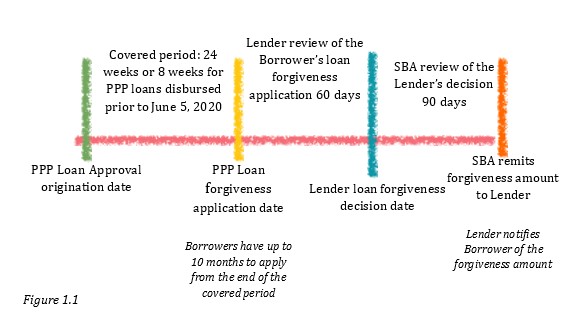Paycheck Protection Program (PPP) loans taken out in connection with the coronavirus (COVID-19) crisis that were subsequently forgiven raise a number of tax questions. A PPP loan may be forgiven in an amount equal to the sum of: (1) payroll costs; (2) interest (but not principal) payments on covered mortgage obligations (for mortgages before February 15, 2020); (3) any payment for any covered rent obligation (for leases beginning before February 15, 2020); (4) covered utility payments (for utilities that were turned on before February 15, 2020), during the covered period.
Typically, for PPP borrowers the covered period would have been the 24-week period beginning on the PPP loan disbursement date, with a cutoff date set on December 31, 2020, if the 24-week would have otherwise ended in 2021. For borrowers taking out a PPP loan before June 5, 2020, there was an option to elect a shorter 8-week covered period.
At the end of the covered period, borrowers will have had up to ten (10) months to apply for the loan forgiveness. From the loan forgiveness application date, lenders will have had up to 60 days to make whether a borrower met conditions for the loan forgiveness. Upon lender’s determination, U.S. Small Business Administration will have had 90 days to review the lender’s decision and then remit the amount of the forgiven loan to the lender (if any). Upon the U.S. Small Business Administration’s approval, the lender will have notified the borrower of the loan forgiveness amount. As the above described timeline outlines, for some borrowers forgiveness may be determined in 2020. However, for most borrowers forgiveness will be determined in 2021 upon receipt of the final forgiveness notification from the lender, raising interesting tax consequences discussed below. See Figure 1.1. below.

No cancellation of debt income for PPP debt forgiveness
Generally, the reduction or cancellation of indebtedness results in cancellation of debt (COD) income to the debtor. However, PPP borrowers are specifically allowed to exclude from gross income forgiven amounts of PPP loans.
Congress clarifies that expenses paid with PPP proceeds are deductible
On December 27, 2020, the President signed into law the Consolidated Appropriations Act, 2021 (the CAA, 2021), which included two separate acts: (1) the Taxpayer Certainty and Disaster Tax Relief Act of 2020 (the TCDTR) and (2) the COVID-related Tax Relief Act of 2020 (the COVIDTRA). The CAA, 2021 included a number of business tax provisions, most notably clarifying that taxpayers whose Payroll Protection Program (PPP) loans are forgiven are allowed deductions for otherwise deductible expenses paid with the proceeds. Additionally, CAA, 2021 provides that the tax basis and other attributes of the borrower’s assets won’t be reduced as a result of the forgiveness.
Claiming otherwise deductible expenses financed with PPP loan proceeds prior to the lender’s forgiveness notification
Because expenses paid with PPP proceeds are not deductible, borrowers incurring otherwise deductible expenses face a dilemma whether to claim or not such expenses on their 2020 tax return before their lender will have notified them of the forgiveness amount. There is very limited IRS guidance on the issue, so most borrowers would be well advised to file extensions for their 2020 returns until they will have received the lender’s notification.
Similarly, borrowers making estimated tax payments, while incurring otherwise deductible expenses financed with PPP loan proceeds, face a dilemma whether to include those expenses when estimating taxes owed.
If you have any questions on PPP loan forgiveness, please contact us at 703-525-4000.
This article is for informational purposes only and does not contain or convey legal advice. Consult a lawyer. Any views or opinions expressed herein are those of the authors and are not necessarily the views of any client.

